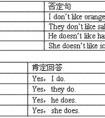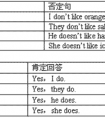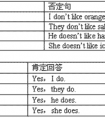用所给单词的适当形式填空。1. They _____ (visit) Shanghai next month. 2. That is an _____ (excite) story. 3. It's very important for us _____ (learn) Englis-八年级英语
I--myself we--ourselves you(单数)
-- yourself you(复数)-- yourselves
2、第三人称的反身代词是由人称代词的宾格加上-self或-selves构成的。如:
she--herself
he --himself
it--itself
they--themselves
one--oneself
例句:
In his twenties, Charles began to write and soon became famous.查尔斯二十多岁的时候开始写作,很快就出名了
It is myself that solved all the problems.是我自己解决了所有的问题。
I want to dress myself warmly.我要穿暖和一点。
变化歌诀:
反身代词代自己,懂得规律很好记
单数人称加self,复数人称selves
一二人称都一样,所有格后加“自己”
第三人称不一样,要用宾格加“自己”
①反身代词不能做主语,但可作主语同位语,放在主语后或句末。如:
我自己去了电影院。
错:Myself went to the cinema .
对:I went to the cinema myself.
②反身代词可以作宾语的同位语
You can go and ask John himself.翻译:你可以去问约翰本人。
③反身代词可以作介词的宾语。
by oneself 全靠自己;
say to oneself 自言自语。
She learnt swimming all by herself.
她是自学游泳的。
She said to herself,"Who am I?"
她自言自语的说:“我是谁?”
④反身代词作动词的宾语
enjoy oneself 玩得高兴;
help oneself (to) 随便用……;
hurt oneself 伤害自己;
teach oneself 自学;
get dressed oneself 自己穿衣
seat oneself 就坐
反身代词用法口诀:
反身代词表自身,句中可作三成分
动介后面用作宾,表示动作回自身
句中强调同位语,主语宾语后变跟
系动be后作表语,这个用法要牢记
反身代词有的用法:
1、作宾语,此时的宾语指的就是主语。
A.非强调用法
这种用法通常表示反身代词与句中的主语是同一人。
它在句中作宾语,不能省略,否则该句是一个意义不完整的错句。例如:
(1)Jane is too young to look after herself.(简年纪太小,以至于不能照看自己)
(2)I teach myself English.(我自学英语)
(3)He didn't hurt himself, thank goodness.(他未伤了他自己,谢天谢地。)
B.强调用法
反身代词在强调用法中表示强调,即用来加强某个名词或者代词的语气,可译成“亲自”、“本人”。
此时,它在句中作同位语。即使去掉,也不影响句子的完整性。例如:
(1)You must do it yourself.(你必须自己做)
(2)I myself did the homework last night。(昨晚是我自己做了家庭作业)
C.与by搭配
当反身代词与by搭配时,意为:单独地,没有人帮助的。例如:
(1)We must finish it all by ourselves.(我们必须全靠自己去完成。)
(2)He can swim all by himself.(他能独自一个人游泳。)
D.宾语转换为主语一定要记牢有些形容词需有反身代词
Please help yourself to some fish. 请你随便吃点鱼。
We enjoyed ourselves last night. 我们昨晚玩得很开心。
E.用于及物动词+宾语+介词
take pride in, be annoyed with, help oneself to sth.
I could not dress (myself) up at that time. 那个时候我不能打扮我自己。
F.注意:有些动词后不跟反身代词,get up,sit down ,wake up等。
注:反身代词和人称代词作宾语时具有不同的含义。如:
He saw himself in the mirror.他在镜子里看见了他自己。(himself 和 he 为同一人)
He saw him in the mirror.他在镜子里看见了他。(him 显然指另外一人)
2、作表语,此时的表语指的就是主语。可用在be,feel,seem,look等系动词之后,通常描述身体、精神等方面的感觉或状态。例如:
After a few days of rest,he was more himself again.
休息几天之后,他的身体好多了。
She does't look herself today.
她今天看上去神色不正常。
I am not myself today.
我今天不舒服。
3、作同位语,用来加强语气或表示强调,可译为“亲自”,“本人”。如果省去反身代词,句子含义也不会有实质性的改变。
这样用时,反身代词在句中的位置比较灵活,如果是做主语的同位语,可以紧跟在该名词或代词的后面,也可置于句末。
The thing itself is not important. 翻译:事情本身并不重要。
4、在不强调的情况下,but, except, for 等介词后宾语用反身代词或人称代词宾格均可。如:
No one but myself (me) is hurt.
5、作主语
反身代词本身不能单独作主语。
(错)Myself drove the car.
(对)I myself drove the car. 我自己开车。
但在and, or, nor连接的并列主语中,第二个主语可用反身代词,特别是myself 作主语。
例如:Charles and myself saw it.
反身代词不能做主语,但可以放在主语后或句末。
例如:I did it by myself.
|
单数 |
复数 | |
|
第一人称 |
myself |
ourselves |
|
第二人称 |
yourself |
yourselves |
|
第三人称 |
himself |
themselves |
考点名称:形容词
- 形容词:
简称adj.或a,形容词用来修饰名词或代词,表示人或事物的性质、状态,和特征的程度好坏与否,形容词在句中作定语,表语,宾语补足语。
她是一个好学生,她学习努力。She is a good student, and she works hard.
这辆自行车很贵。This bike is expensive.
对不起,我现在很忙。I am sorry, I'm busy now.
你为这次会议做好准备了吗? Have you got everything ready for the meeting? - 形容词的语法功能:
一、作定语
He is the greatest writer alive.他是依然健在的伟大的作家。
Somewone else has done it.别人已经做了这事。
二、作补语
形容词做主语补足语和宾语补足语时,可以表示其现状、状态,也可以表示某一动作的结果,并常用在表示“认为,看待”的动词如believe,prove,consider等候。例如:
The news made her sad.这消息使他感到非常悲伤。
Don't marry young.不要早婚。
三、作状语
形容词或形容词短语可作状语,形容词作状语时,可以看作是“being+形容词”结构的省略,可表示时间、原因、条件、方式、强调或伴随状况等意义。例如:
Enthusiastic,they are co-operative.热心的时候他们是很合作的。
Rich or poor, young or old, we all have problems.不管是穷人还是富人,不管是年轻人还是老人,我们都有问题。
四、做表语
The ship was adrift on unknown seas.那艘船在陌生的海域漂流。
五、做主语
Old and young joined the discussion.
Rich or poor meant the same to him.作感叹语
Very good!Say it again.
Stupid!He must be crasy. 形容词的几个特殊用法:
most 同形容词连用而不用 the, 表示 " 极,很,非常, 十分"。
It's most dangerous to be here. 在这儿太危险。
I cannot do it, it's most difficult. 我干不了这件事,太难了。
"The+形容词比较级..., the+形容词比较级..." 表示 " 越... 就越..."。
The more you study, the more you know. 你学的越多, 就知道的越多。
The more I have, the more I want. 我越有就越想要有。
The more, the better. 越多越好。
" 形容词比较级 + and + 形容词比较级 ", 表示 " 越来越... "。
It's getting hotter and hotter. 天气越来越热了.
It's pity he is getting poorer and poorer. 真可怜他越来越穷了。
The computer is cheaper and cheaper. 计算机越来越便宜。
The more and more people focus on the meeting next year. 越来越多的人关注明年的会议。
主语+谓语(系动词)+as+形容词原形+as+从句。表示两者对比相同。
This box is as big as mine. 这个盒子和我的一样大。
This coat is as cheap as that one. 这件衣服同那件衣服一样便宜。
I study English as hard as my brother. 我同我兄弟一样学习努力。
the + 形容词 表示某种人。
He always helps the poor. 他经常帮助穷人。
I like to have a talk with the young. 我喜欢同年轻人谈话。
- 最新内容
- 相关内容
- 网友推荐
- 图文推荐
| [家长教育] 孩子为什么会和父母感情疏离? (2019-07-14) |
| [教师分享] 给远方姐姐的一封信 (2018-11-07) |
| [教师分享] 伸缩门 (2018-11-07) |
| [教师分享] 回家乡 (2018-11-07) |
| [教师分享] 是风味也是人间 (2018-11-07) |
| [教师分享] 一句格言的启示 (2018-11-07) |
| [教师分享] 无规矩不成方圆 (2018-11-07) |
| [教师分享] 第十届全国教育名家论坛有感(二) (2018-11-07) |
| [教师分享] 贪玩的小狗 (2018-11-07) |
| [教师分享] 未命名文章 (2018-11-07) |






